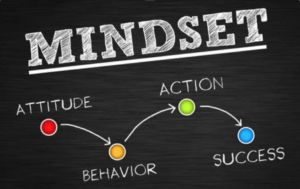
Mindsets are fundamental to our thinking and behavior, shaping our perceptions, beliefs, and actions. They influence how we approach challenges, setbacks, and opportunities, and ultimately determine our capacity for growth, success, and fulfillment.
Here are some of the key reasons why Mindsets are so important:
- Mindsets shape our approach to learning and development. A Mastery Mindset fosters a lifelong commitment to learning, while a performance mindset may prioritize achieving outcomes over the learning process itself.
- Mindsets influence our motivation and resilience. A Mastery Mindset fuels intrinsic motivation, while a performance mindset may rely more heavily on external rewards and recognition. A Resilient Mindset helps us bounce back from setbacks, while a Fragile Mindset may lead to discouragement and self-doubt.
- Mindsets determine our perception of challenges and opportunities. A Mastery Mindset views challenges as opportunities for growth, while a Performance Mindset may view them as threats to success.
- Mindsets shape our relationships and interactions with others. A Collaborative Mindset fosters teamwork and cooperation, while a Competitive Mindset may lead to unhealthy rivalry and conflict.
- Mindsets affect our overall well-being and happiness. A Growth Mindset promotes a sense of agency and belief in one’s abilities, while a Fixed Mindset may lead to feelings of helplessness and inadequacy.
Mindsets are powerful tools that can either propel us towards success or hinder our progress. By understanding the different types of mindsets and cultivating a growth-oriented approach, we can unleash our potential, achieve our goals, and live a fulfilling life.

Types of Mindsets:
We analyzed in the past why it is important to have a Growth Mindset (vs. a Fixed Mindset). In addition to these two main types, there are also several other types of Mindsets that have been identified, such as:
- Mastery Mindset: People with a Mastery Mindset focus on learning and improving, rather than on being perfect. They are always looking for new challenges and opportunities to learn.
- Performance Mindset: People with a Performance Mindset focus on demonstrating their abilities and achieving success. They are often driven by external rewards and recognition.
- Adaptive Mindset: People with an Adaptive Mindset are able to adjust their thinking and behavior to meet the demands of different situations. They are flexible and open to new ideas.
- Learning Mindset: A Learning Mindset is similar to a Mastery Mindset, but it emphasizes the importance of seeking feedback and using it to improve. People with a Learning Mindset are not afraid to make mistakes, because they see them as opportunities to learn.
- Approach-avoidance Mindset: An Approach-avoidance Mindset refers to how people perceive and respond to challenges. People with an Approach-avoidance Mindset that is positive toward challenges are more likely to embrace them and see them as opportunities for growth. In contrast, people with an Approach-avoidance Mindset that is negative toward challenges are more likely to avoid them or see them as threats.
- Growth Mindset with Defensiveness: This Mindset combines elements of a Growth Mindset and a Fixed Mindset. People with this mindset believe that their abilities can be developed, but they also have a fear of failure. This can lead them to avoid challenges or give up easily when they face difficulties.
- Cooperative Mindset: A Cooperative Mindset emphasizes collaboration and teamwork. People with a Cooperative Mindset are more likely to share information, help others, and work together to achieve common goals.
- Competitiveness Mindset: A Competitiveness Mindset emphasizes winning and outperforming others. People with a Competitiveness Mindset are more likely to strive for individual success, even if it means taking advantage of others.
- Existential Mindset: An Existential Mindset focuses on the meaning and purpose of life. People with an Existential Mindset are more likely to reflect on their values and beliefs, and they may seek out experiences that help them understand their place in the world.
- Holistic Mindset: A Holistic Mindset emphasizes the interconnectedness of all things. People with a Holistic Mindset are more likely to see the world as a complex system, and they may be interested in understanding how everything is related.
- Resilient Mindset: A Resilient Mindset allows people to bounce back from setbacks and challenges. People with a Resilient Mindset believe in their ability to overcome obstacles, and they are not easily discouraged by failure.

It is important to note that these are just a few examples of the many different types of Mindsets that exist. People can have multiple Mindsets, and their Mindsets can change over time. The specific Mindsets that are most important for you will depend on your individual goals and aspirations.